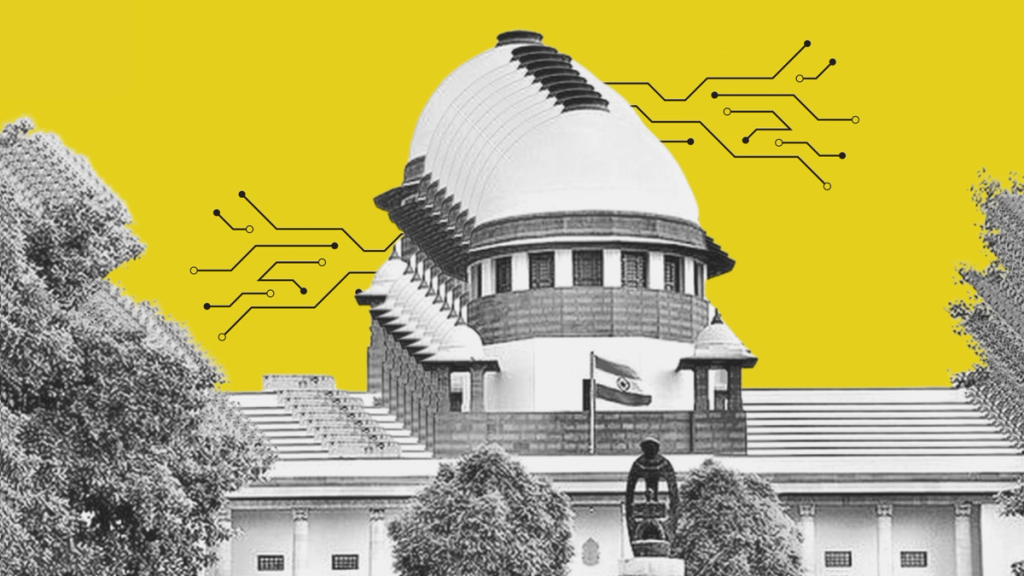
Ethical AI Adoption in the Indian Judiciary: Strengthening Access to Justice
Key Highlights
- AI is increasingly seen as a way to improve efficiency and time management in court processes. For instance, the use of AI-enabled translation and transcription tools can speed up the process of transcribing depositions and arguments, and reduce long standing issues such as delays. Moreover, the use of GenAI tools like ChatGPT in tasks like document drafting is indicative of the ubiquity and ease of access of this technology.
- But current adoption trajectories are not guided by adequate thought to ethical considerations of AI’s risks and harms, or its technical limitations. Judges and policymakers do not perceive AI as a replacement for human decision making, more as a means to augment existing processes, and have, in general, called for a cautious approach. However, they may simultaneously be under-equipped to recognise these limitations.
- Guiding frameworks like procurement processes therefore, can enable courts to streamline AI acquisition. They can support courts in technical evaluation, risk assessment, and risk mitigation, overall ensuring the quality of AI tools. AI adoption guidelines also become a way to integrate AI responsibly for public institutions that also serve as upholders of the law. Such guidelines offer a way to set up a systematic review and evaluation process to support safer, accountable, and responsible AI for courts. These can also help better evaluate vendors and products, and enable setting up of post-contracting management systems to ensure sustainable use of technology.
Why This Project
Across India’s courts, there is a growing appetite for AI adoption. From translation and transcription tools to AI-enabled legal research, case management, and even scheduling, courts are increasingly seeing the value of these technologies. While adoption has largely been cautious, it has also been fragmented, often led by individual judges or through pilots, with no clear framework to guide long-term use.
This is where processes like procurement become critical. AI holds promise, but also serious risks when deployed at scale in public institutions. Experiences from other jurisdictions, such as errors in automated alimony calculations in the UK, highlight the dangers of unchecked implementation. For courts — where justice must not only be done, but seen to be done — responsible pathways for AI adoption are essential.
At present, procurement in the judicial system is ad hoc. There are no clear rules for how AI solutions should be evaluated, no safeguards to ensure vendors deliver on their promises, and little foresight about requirements for their continued use once pilot projects end. Questions around infrastructure costs, technical capacity, and the protection of sensitive judicial data remain unresolved.
By rethinking how courts acquire AI, we see an opportunity to:
- Help courts evaluate ethical and technical risks before adoption.
- Design procurement processes that keep pace with rapid technological change.
- Safeguard judicial data while building sustainable AI practices.
Through this project, we aim to build procurement as a tool of accountability and trust, helping courts adopt AI in ways that are responsible, sustainable, and aligned with the public interest.
We are doing this through a combination of research, expert consultation, workshops, and collaboration to ensure that the guidelines we develop are both rigorous and practical for courts.
Expected Outcomes
With the aim to ensure that AI adoption in courts moves beyond ad hoc, discretion-based decisions, and is instead guided by clear principles and processes, our expected outcomes are:
- Principled Adoption: Establish guiding frameworks that can be applied consistently across different stages and use cases of AI in the judiciary.
- Risk Awareness and Mitigation: Provide courts with practical tools for assessing and addressing ethical, technical, and sustainability risks associated with AI.
- Ease for Procurers: Streamline procurement processes so that they are less burdensome for already overstretched courts, while enabling informed and efficient decision-making.
- Responsible Use of Public Finance: Ensure that investments in AI are accountable, transparent, and in the public interest.
- Transparency and Accountability: Build trust in how AI is deployed within the judicial system by setting standards that protect rights and safeguard sensitive judicial data.
In the long run, these outcomes contribute to broader goals of access to justice, strengthening fundamental rights, and advancing the principles of SDG 16: Peace, Justice, and Strong Institutions.
Ethical AI Adoption in the Indian Judiciary: Strengthening Access to Justice Through Responsible Procurement and Governance
Jointly conducted by DAKSH and Digital Futures Lab, with support from the United Nations Development Programme (UNDP), this project on Ethical AI Adoption in the Indian Judiciary seeks to develop best practices and guidelines for the ethical and robust procurement of AI by courts in India.
Through this project, we seek to develop clear usage guidelines and ethical and robust procurement processes as a way to ensure that the integration of AI in courts adheres to natural justice principles and advances public interest.
Project Lead: Urvashi Aneja
Project Coordination and Researcher: Dona Mathew
Communications: Shivranjana Rathore


